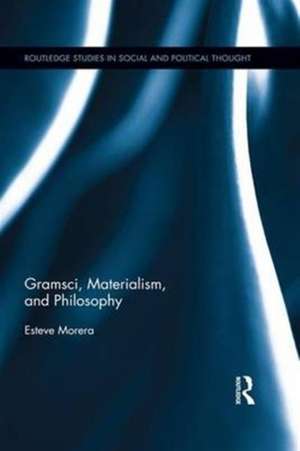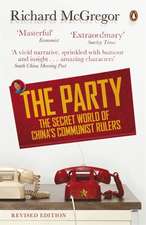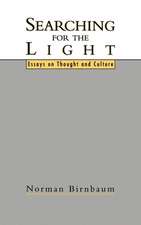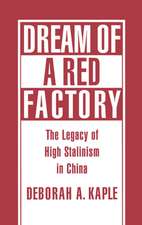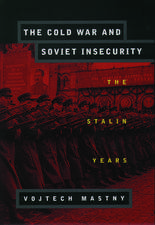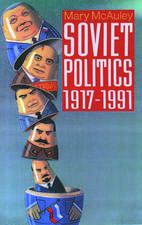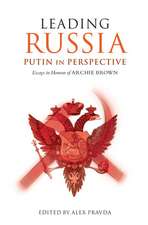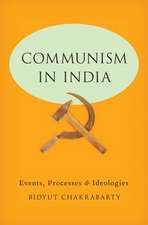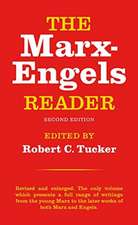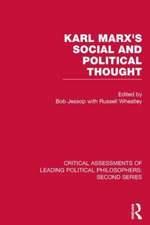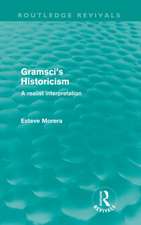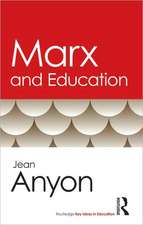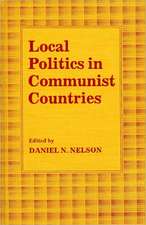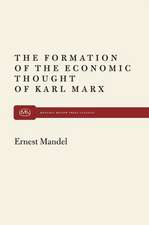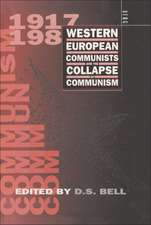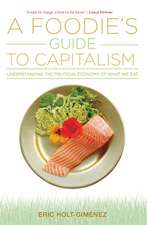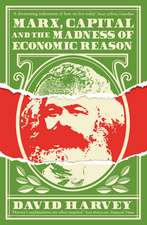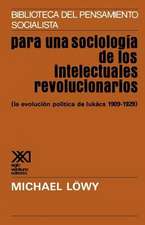Gramsci, Materialism, and Philosophy: Routledge Studies in Social and Political Thought
Autor Esteve Moreraen Limba Engleză Paperback – 31 mai 2016
In this book, Esteve Morera connects Marxist philosophy to the broader philosophical discussion of materialism in metaphysics, the philosophy science, philosophy of mind, and naturalised ethics. Each chapter deals with a particular aspect related to materialism and its consequences, the sorts of things that, if materialism is true, need to be confronted. Morera critiques, and rejects Gramsci’s conception of matter and materialism and concludes that that philosophical materialism is compatible with freedom, and as a consequence, offers a good foundation for ethical life.
Gramsci, Materialism, and Philosophy is an original contribution to the philosophically vital debates around the meaning, limitations, implications, and possibilities of philosophical materialism as it is a contribution to the critical literature on Gramsci.
| Toate formatele și edițiile | Preț | Express |
|---|---|---|
| Paperback (1) | 380.03 lei 6-8 săpt. | |
| Taylor & Francis – 31 mai 2016 | 380.03 lei 6-8 săpt. | |
| Hardback (1) | 1054.61 lei 6-8 săpt. | |
| Taylor & Francis – 25 mar 2014 | 1054.61 lei 6-8 săpt. |
Din seria Routledge Studies in Social and Political Thought
-
 Preț: 152.43 lei
Preț: 152.43 lei -
 Preț: 296.65 lei
Preț: 296.65 lei -
 Preț: 311.70 lei
Preț: 311.70 lei -
 Preț: 310.96 lei
Preț: 310.96 lei -
 Preț: 347.93 lei
Preț: 347.93 lei -
 Preț: 310.41 lei
Preț: 310.41 lei -
 Preț: 303.89 lei
Preț: 303.89 lei -
 Preț: 319.08 lei
Preț: 319.08 lei -
 Preț: 333.32 lei
Preț: 333.32 lei -
 Preț: 309.82 lei
Preț: 309.82 lei -
 Preț: 287.68 lei
Preț: 287.68 lei -
 Preț: 324.20 lei
Preț: 324.20 lei -
 Preț: 389.38 lei
Preț: 389.38 lei -
 Preț: 229.38 lei
Preț: 229.38 lei -
 Preț: 310.29 lei
Preț: 310.29 lei -
 Preț: 311.41 lei
Preț: 311.41 lei -
 Preț: 318.31 lei
Preț: 318.31 lei -
 Preț: 216.07 lei
Preț: 216.07 lei -
 Preț: 354.07 lei
Preț: 354.07 lei -
 Preț: 279.47 lei
Preț: 279.47 lei -
 Preț: 347.26 lei
Preț: 347.26 lei -
 Preț: 387.03 lei
Preț: 387.03 lei - 18%
 Preț: 1110.47 lei
Preț: 1110.47 lei - 18%
 Preț: 1055.51 lei
Preț: 1055.51 lei - 18%
 Preț: 1058.43 lei
Preț: 1058.43 lei - 18%
 Preț: 1005.73 lei
Preț: 1005.73 lei -
 Preț: 409.73 lei
Preț: 409.73 lei - 18%
 Preț: 1061.84 lei
Preț: 1061.84 lei - 18%
 Preț: 1061.22 lei
Preț: 1061.22 lei - 25%
 Preț: 544.67 lei
Preț: 544.67 lei - 18%
 Preț: 1215.71 lei
Preț: 1215.71 lei - 18%
 Preț: 998.71 lei
Preț: 998.71 lei - 18%
 Preț: 1109.99 lei
Preț: 1109.99 lei -
 Preț: 488.71 lei
Preț: 488.71 lei - 30%
 Preț: 847.73 lei
Preț: 847.73 lei -
 Preț: 416.12 lei
Preț: 416.12 lei - 18%
 Preț: 1054.75 lei
Preț: 1054.75 lei - 28%
 Preț: 769.72 lei
Preț: 769.72 lei - 18%
 Preț: 1059.84 lei
Preț: 1059.84 lei -
 Preț: 489.99 lei
Preț: 489.99 lei - 18%
 Preț: 1062.31 lei
Preț: 1062.31 lei - 18%
 Preț: 1108.42 lei
Preț: 1108.42 lei -
 Preț: 382.65 lei
Preț: 382.65 lei - 42%
 Preț: 181.06 lei
Preț: 181.06 lei - 26%
 Preț: 822.36 lei
Preț: 822.36 lei
Preț: 380.03 lei
Nou
Puncte Express: 570
Preț estimativ în valută:
72.73€ • 75.65$ • 60.04£
72.73€ • 75.65$ • 60.04£
Carte tipărită la comandă
Livrare economică 14-28 aprilie
Preluare comenzi: 021 569.72.76
Specificații
ISBN-13: 9781138696389
ISBN-10: 1138696382
Pagini: 146
Dimensiuni: 156 x 234 x 15 mm
Greutate: 0.23 kg
Ediția:1
Editura: Taylor & Francis
Colecția Routledge
Seria Routledge Studies in Social and Political Thought
Locul publicării:Oxford, United Kingdom
ISBN-10: 1138696382
Pagini: 146
Dimensiuni: 156 x 234 x 15 mm
Greutate: 0.23 kg
Ediția:1
Editura: Taylor & Francis
Colecția Routledge
Seria Routledge Studies in Social and Political Thought
Locul publicării:Oxford, United Kingdom
Public țintă
PostgraduateCuprins
Introduction. 1. Gramsci and Philosophy. 2. Materialism. 3. Gramsci's Conception of "Organic." 4. Human Nature. 5. Materialism and the Possibility of Ethical Life. 6. Concluding Remarks.
Notă biografică
Esteve Morera is Associate Professor in the Departments of Philosophy and Political Science at York University. He is the author of Gramsci's Historicism: A Realist Interpretation (1990) and a number of articles on Gramsci and Vico. His research interests include social and political philosophy, philosophy of history, critical theory, and continental philosophy, especially Vico, Kant, Marx, Croce, and Gramsci.
Recenzii
“Esteve Morera has written a lucid and provocative book that challenges Gramsci’s conception of materialism. Through a detailed analysis of the Prison Notebooks, Morera demonstrates how philosophical materialism connects to understandings of the philosophy of praxis, organicism, human nature, ethics, and freedom. Ultimately, as Morera argues, returning to the question of materialism has the potential to provide the foundation for ethico-political praxis, the revitalization of the socialist project, and the creation of a new civilization.”
—Marcus E. Green, Otterbein University
“In Gramsci, Materialism, and Philosophy Morera builds on his well-deserved reputation as a leading interpreter of the still vital philosophy of Gramsci. The great strength of the book is to bring the two estranged traditions in materialist philosophy—historical and scientific—into needed dialogue. The result is a book that should be read by Marxists and naturalistic philosophers alike.”
—Jeff Noonan, University of Windsor
"Esteve Morera has written a lucid and provocative book that challenges Gramsci’s conception of materialism. Through a detailed analysis of the Prison Notebooks, Morera demonstrates how philosophical materialism connects to understandings of the philosophy of praxis, organicism, human nature, ethics, and freedom. Ultimately, as Morera argues, returning to the question of materialism has the potential to provide the foundation for ethico-political praxis, the revitalization of the socialist project, and the creation of a new civilization."
—Marcus E. Green, Otterbein University
—Marcus E. Green, Otterbein University
“In Gramsci, Materialism, and Philosophy Morera builds on his well-deserved reputation as a leading interpreter of the still vital philosophy of Gramsci. The great strength of the book is to bring the two estranged traditions in materialist philosophy—historical and scientific—into needed dialogue. The result is a book that should be read by Marxists and naturalistic philosophers alike.”
—Jeff Noonan, University of Windsor
"Esteve Morera has written a lucid and provocative book that challenges Gramsci’s conception of materialism. Through a detailed analysis of the Prison Notebooks, Morera demonstrates how philosophical materialism connects to understandings of the philosophy of praxis, organicism, human nature, ethics, and freedom. Ultimately, as Morera argues, returning to the question of materialism has the potential to provide the foundation for ethico-political praxis, the revitalization of the socialist project, and the creation of a new civilization."
—Marcus E. Green, Otterbein University
Descriere
In this book, Esteve Morera connects Marxist philosophy to the broader philosophical discussion of materialism in metaphysics, the philosophy science, philosophy of mind, and naturalised ethics. Each chapter deals with a particular aspect related to materialism and its consequences, the sorts of things that, if materialism is true, need to be confronted. Morera critiques, and rejects Gramsci’s conception of matter and materialism and concludes that that philosophical materialism is compatible with freedom, and as a consequence, offers a good foundation for ethical life.
